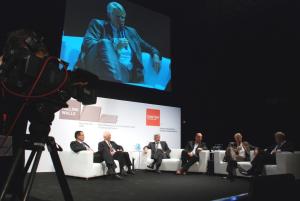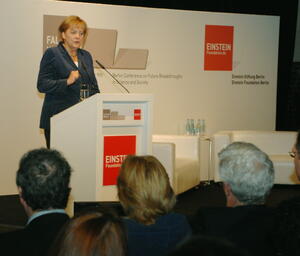ITER at Falling Walls Conference in Berlin
On Monday, the world's eyes were on Berlin. "Gänsehaut-Tag" ("Goose-bump Day") was how one TV commentator described the anniversary of the day on which, 20 years ago, the Berlin Wall collapsed. And indeed, to watch the crowds that night gather in front of the Brandenburger Tor, peacefully commemorating the events that led to the reunification of Germany after 28 years of East-West separation, was a deeply emotional moment.
A few kilometers east of the gate that has become a beacon for freedom, in a pumping station-turned-theatre situated on the former "death strip," another event commemorating the fall of the Wall took place. "Which are the next walls to fall?" the Einstein Foundation Berlin had asked leading scientists from various disciplines—inviting them to present their answers at a conference the newspapers had labelled "speed dating with science."
Each of the 22 invited speakers had precisely 15 minutes to embark on a voyage to the hidden universe (Rolf Heuer, CERN), to present cheap new vaccines against malaria (Peter Seeberger, University Berlin) or to introduce new technology for reading neurological signals (Miguel Nicolelis, Duke University). Representing the ITER Organization, Principal Deputy Director-General Norbert Holtkamp invited the audience to learn more about the quest for fusion energy.
In addition to this round-trip to the frontiers of science, a further highlight of the "Falling Walls Conference" was the speech by the German Chancellor Angela Merkel. Despite a very busy agenda, this former physicist who grew up in East Germany had set aside one hour to address the scientific community and to talk about 9 November 1989—a date that changed the life of a nation and her own. "That night, the impossible became possible," Merkel said. "This peaceful revolution would not have been possible without the courage of the people. Both in politics and in science ... no one can make it on his own any more." Addressing the illustrious science community before her, she invited the audience to be good examples to politicians by thinking first and then acting.
In her forty-minute speech that was rewarded by a standing ovation, Merkel did not forget to remind the audience that—despite all the euphoria about the collapse of the Berlin Wall—9 November was also a very black day in the history of Germany. During the night of 9-10 November, 1938, the Nazis ran a coordinated attack on Jewish people and their property. One hundred Jews were killed, and many thousands put into concentration camps. Because the raging crowd also destroyed most Jewish shops and 267 synagoges, the night is remembered as "Kristallnacht" or 'The night of broken glass."




